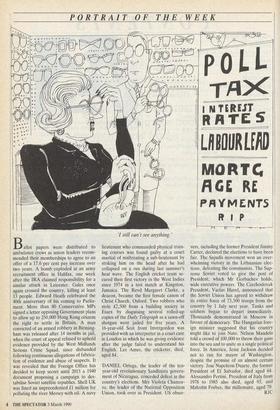PORTRAIT OF THE WEEK
'I still can't see anything.' Ballot papers were distributed to ambulance crews as union leaders recom- mended their memberships to agree to an offer of a 17.6 per cent pay increase over two years. A bomb exploded at an army recruitment office in Halifax, one week after the IRA claimed responsibility for a similar attack in Leicester. Gales once again crossed the country, killing at least 13 people. Edward Heath celebrated the 40th anniversary of his coming to Parlia- ment. More than 80 Conservative MPs signed a letter opposing Government plans to allow up to 250,000 Hong Kong citizens the right to settle in Britain. A man convicted of an armed robbery in Birming- ham was released after 14 months in jail, when the court of appeal refused to uphold evidence provided by the West Midlands Serious Crime Squad, since disbanded following continuous allegations of fabrica- tion of evidence and abuse of suspects. It was revealed that the Foreign Office has decided to keep secret until 2015 a 1940 document proposing a campaign to des- tabilise Soviet satellite republics. Shell UK was fined an unprecedented £ 1 million for polluting the river Mersey with oil. A navy lieutenant who commanded physical train- ing courses was found guilty at a court martial of maltreating a sub-lieutenant by striking him on the head after he had collapsed on a run during last summer's heat wave. The English cricket team se- cured their first victory in the West Indies since 1974 in a test match at Kingston, Jamaica. The Revd Margaret Clarke, a deacon, became the first female canon of Christ Church, Oxford. Two robbers who stole £2,500 from a building society in Essex by disguising several rolled-up copies of the Daily Telegraph as a sawn-off shotgun were jailed for five years. A 16-year-old Scot from Invergordon was provided with an interpreter in a court case in London in which he was giving evidence after the judge failed to understand his English. Les Ames, the cricketer, died, aged 84.
DANIEL Ortega, the leader of the ten- year-old revolutionary Sandinista govern- ment of Nicaragua, conceded defeat in the country's elections, Mrs Violeta Chamor- ro, the leader of the National Opposition Union, took over as President. US obser-
vers, including the former President Jimmy Carter, declared the elections to have been fair. The Sajudis movement won an over- whelming victory in the Lithuanian elec- tions, defeating the communists. The Sup- reme Soviet voted to give the post of President, which Mr Gorbachev holds, wide executive powers. The Czechoslovak President, Vaclav Havel, announced that the Soviet Union has agreed to withdraw its entire force of 73,500 troops from the country by 1 July next year. Tanks and soldiers began to depart immediately. Thousands demonstrated in Moscow in favour of democracy. The Hungarian fore- ign minister suggested that his country might like to join Nato. Nelson Mandela told a crowd of 100,000 to throw their guns into the sea and to unite as a single political force. In America, Jesse Jackson decided not to run for mayor of Washington, despite the promise of an almost certain victory. Jose Napoleon Duarte, the former President of El Salvador, died aged 64. Alessandro Pertini, President of Italy from 1978 to 1985 also died, aged 93, and Malcolm Forbes, the millionaire, aged 70.
RJC


























































 Previous page
Previous page